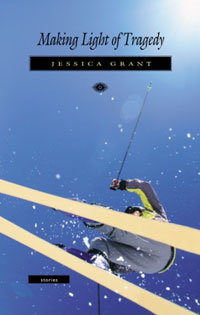DominionSections
Browse Articles
- IndependentMedia.ca
- MostlyWater.org
- Seven Oaks
- BASICS Newsletter
- Siafu
- Briarpatch Magazine
- The Leveller
- Groundwire
- Redwire Magazine
- Canadian Dimension
- CKDU News Collective
- Common Ground
- Shunpiking Magazine
- The Real News
- Our Times
- À babord !
- Blackfly Magazine
- Guerilla News Network
- The Other Side
- The Sunday Independent
- Vive le Canada
- Elements
- ACTivist Magazine
- The Tyee
- TML Daily
- New Socialist
- Relay (Socialist Project)
- Socialist Worker
- Socialist Action
- Rabble.ca
- Straight Goods
- Alternatives Journal
- This Magazine
- Dialogue Magazine
- Orato
- Rebel Youth
- NB Media Co-op
Radio
Books, November 2004
November 6, 2004
Books, November 2004
 Mirabel
Mirabel
by Pierre Nepveu
Signal Editions, 2004
This new English translation of the 2003 Governor General’s Award winner Lignes Aeriennes gives anglophone Canada an eerie, slanted glimpse into one of its most unlikely epic disasters: the birth and death of an airport just outside Montreal. The first two sections of the book, entitled Surveyor’s Notebook, Summer 1969, and Disturbances, focus on the animate and inanimate communities displaced by the construction of the monster airport. “I counted my steps to that boulder,” the surveyor says, “the size of a bull, with no memory but of himself, his folds of moss soaked with dew, his belly wrinkled like an old woman’s.” From here, Nepveu cuts straight to 1997, when the airport is an obsolete dungeon for “Ghosts of suitcases turning round and round in an eternity of non-arrivals”. Despite some regrettable repetition–the word “lamentation” appeared lamentably often, and “women” was used with uncomfortable frequency as a stand-in for the concept of helplessness–Nepveu’s elegy is darkly, cleanly worded, forcing us to contend with a past which has left the spacious fabrications of the present rattling empty. --Linda Besner
 Making Light of Tragedy
Making Light of Tragedy
by Jessica Grant
Porcupine's Quill, 2004
In a choice story, "Bellicrostic", the speaker, who is an editor for a literary journal, takes seriously for a moment the joke that she might be illiterate. "Eye problems were her best bet. She would feign blindness while she learned to read. Hooked on Phonics tapes in the car. What car? You're blind. Right." There is a comedian's voice musing here, that sense of mutability of meaning, as the speaker takes the long way round or a shortcut connection that mockingly goose-steps alongside sense. Grant's representative speaker is the type who not only wonders if walking like a pregnant woman could actually fool her body into being pregnant, but tries it. There is nothing silly about this collection: the humour is a digging tool, scraping away the assumptions that deaden our engagement with our surroundings and ourselves. The characters here are innocently intelligent, with strong plain questions, always open to–indeed attracted by–the possibility that so far they have been wrong about everything. In Grant's world view, security should never be taken for granted, and calamity is a viable option for any story, any prediction. She surprises us, however, by allowing any given character's penchant for seemingly destructive action to bring them only somewhere different, often somewhere better. Generously, she allows us to come with them. --Linda Besner
 Monk's Fruit
Monk's Fruit
by A.J. Levin
Nightwood, 2004
Some lines and images of this collection are memorable: from "The World's Oldest Toast", the grumpy admission, "So on the day my daughter/ your grandmother,/ was born–the first thing we liked about/ the New World–my wife Chana saved/ a piece of toast. There wasn't/ enough money for bronzed booties." Especially when we hear that it was "revered unbuttered" through the Depression, Levin's piece of toast makes the leap from quirky cultural jetsam to small but valiant raft capable of bearing symbolic weight. Often, however, Levin's attempts to invent surprising word pairings provokes nothing more than a physical sensation of distaste: "Why work markings onto paper,/ tree corpse, when it could warm/ the winter dust, our iced stew?" With its unsettled mix of classical and popular settings and themes, Levin's verse feels a bit garbled; in particular, his preoccupation with identifying ethnicities verges on the obsessive. Levin's first collection feels like a series of elbow nudges in the ribs, as he hashes over old material without arriving at many new insights. --Linda Besner
 What's Remembered
What's Remembered
by Arthur Motyer
Cormorant, 2004
The novel is framed in a Toronto bar where an English professor, Peter, tells his life story to Chris, an artist he met just three hours before. Moving at memory's pace, sometimes glossing over whole years in a few sentences, sometimes lingering for pages over a single course at a dinner party, the book captures the emotions and experiences of a generation of gay men often forgotten, one that lived in the closet but still, through the gaps in the slats, witnessed the birth and slow growth of the gay civil rights movement. Motyer ends the book in 1979, before the AIDS crisis, a move which infuses the book with both a sense of hope and a macabre dramatic irony. Unrequited love and anonymous bathhouse sex contrast with Peter's quest to understand the Romantic ideal of love and to discover if–between two men–this kind of love is possible. While Motyer's reliance on literary allusion sometimes traps him in pretension, on the whole the writing is meditative, intelligently guiding the reader through an intricate and complex era. --Matthew Trafford
Related articles:
By the same author:
Archived Site
The Dominion is a monthly paper published by an incipient network of independent journalists in Canada. It aims to provide accurate, critical coverage that is accountable to its readers and the subjects it tackles. Taking its name from Canada's official status as both a colony and a colonial force, the Dominion examines politics, culture and daily life with a view to understanding the exercise of power.